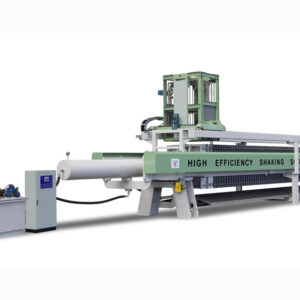JWI (J-Press®) filter presses are designed to handle variations in feed chemistry or composition effectively, ensuring efficient solid-liquid separation across a wide range of industrial applications.
Here are some ways in which JWI filter presses manage variations in feed chemistry or composition:
- Material Selection: JWI filter presses are constructed using materials that are compatible with a wide range of chemical compositions. The choice of materials for filter plates, frames, seals, and other components is carefully considered to withstand exposure to different chemicals without corrosion or degradation.
- Chemical Resistance: The materials used in JWI filter presses are selected for their chemical resistance properties, ensuring durability and long-term performance in aggressive chemical environments. Components are resistant to corrosion, erosion, and chemical attack, even when exposed to harsh chemicals.
- Sealing Systems: JWI filter presses are equipped with sealing systems designed to prevent leaks and maintain tight seals, even when filtering chemically aggressive slurries. High-quality seals made from compatible materials ensure reliable performance and prevent contamination of filtrate.
- Filter Media Compatibility: JWI filter presses accommodate various types of filter media, including filter cloths and membranes, designed to handle different chemical compositions. Filter media with appropriate pore sizes and chemical resistance properties are selected to ensure efficient solid-liquid separation.
- Process Optimization: JWI filter presses allow for optimization of filtration parameters, including pressure, temperature, jwi filter presses and cycle times, to accommodate variations in feed chemistry or composition. Adjustments can be made to filtration conditions to optimize performance and maximize filtration efficiency.
- Chemical Conditioning: In some cases, chemical conditioning may be employed to modify the feed chemistry or composition before filtration. Chemical additives or treatments can alter the properties of the slurry to improve filtration performance, enhance cake formation, or facilitate solids removal.
- Specialized Features: JWI filter presses may incorporate specialized features or options to address specific challenges associated with variations in feed chemistry or composition. These may include advanced cake washing systems, membrane filter plate technology, or automatic control systems for precise process management.
- Operator Training and Support: Proper operator training and support ensure that users understand how to operate and maintain JWI filter presses effectively, especially when handling feed streams with varying chemical compositions. Training programs provide operators with the knowledge and skills needed to optimize filtration performance and troubleshoot issues as they arise.
Overall, JWI filter presses are designed to handle variations in feed chemistry or composition by incorporating durable materials, robust sealing systems, flexible process controls, and specialized features to ensure efficient and reliable solid-liquid separation across diverse industrial applications.
